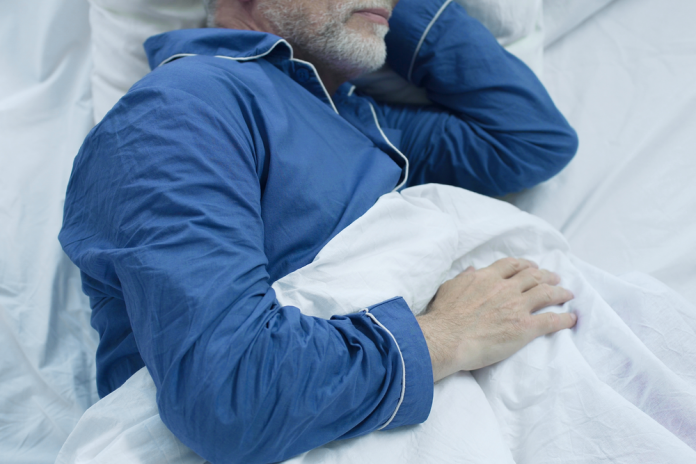Do older people need less sleep? Sleep for seniors may seem confusing. However, sleep and age can go hand in hand with balanced, healthy habits.
Read on to learn more about sleep for adults, including how much sleep to get based on age.
Old Age And Sleep Patterns
Sleeping difficulties and aging are intricately linked. The good news is that sleep problems are not inevitable.
For people over the age of 65, sleep problems may arise. This can lead to a reduction in quality of life. As many as 40-70% of older adults deal with sleep disturbances, so those who struggle should remember they are not alone.
Some common symptoms of poor sleep include:
- Irritability
- Forgetfulness
- Depressed feelings
- An increase in falls or accidents
Why Do Elderly Sleep More?
Since sleep is fundamental to good health regardless of age, it is important to address the root causes of poor sleep.
The body has a basic internal clock called the hypothalamus. This center controls the body’s circadian rhythms, which are daily cycles that moderate patterns like hunger, hormones, and sleep.
As people age, it is normal for certain functions to deteriorate. Natural aging patterns can cause a disruption in circadian rhythms. The following are potential changes that occur in sleep patterns when people age.
Sleep Schedules Shift
With age, the body’s circadian rhythms shift. Older adults tend to wake up earlier, but that also means getting tired earlier in the evening.
Interruptions in sleep, such as waking up during the night, are also common with old age due to shifting stages of sleep.
Afternoon Snoozes Occur
Along with going to sleep on the early side, aging adults also are prone to afternoon naps. This practice can help extend daylight hours for the elderly and can help them keep up with activities.
For example, older adults wanting to spend time with their grandkids in the evening may want to take an afternoon nap in order to have enough energy.
In fact, studies show that as many as 25% of older adults take naps, which is over twice the rate of young adults who take naps. Unfortunately, seniors who nap late in the day may have trouble sleeping and find it harder to fall asleep in the evening.
Recovery Takes Time
With age, the body also finds it harder to recuperate from sleep. What were once annoyances in younger years, like jet lag or daylight savings time, can have a big impact on one’s sleep schedule.
Overall, older adults need six to eight hours of sleep each night. However, they face unique struggles in obtaining it.
How To Sleep Better In Old Age
The good news is that the body can be primed for good sleep, even with old age. Here are a few tips for achieving a good night’s sleep.
Spend Time In Sunlight
Daylight helps the brain make sense of what time of day it is. Unfortunately, some of those restricted to nursing homes or homebound due to disability face a few challenges in getting outside.
Even just 15 minutes next to an open window or on a stroll outside can make a difference in influencing sleep patterns (and give the body much-needed vitamin D).
Have Hormones Checked
Older adults may struggle to obtain healthy sleep due to a hormone imbalance. Some hormones that influence sleep when aging include melatonin and cortisol. These two hormones play significant roles in stress and sleep response.
Address Additional Health Conditions
Mental health struggles, such as depression or anxiety, can also cause changes in sleep. Poor stress management, traumatic experiences, and other mental health issues can also cause shifts in sleep schedules.
Physical conditions can also affect the quality and amount of sleep seniors get. Some potential conditions that can impact sleep include:
- Heart disease
- Diabetes
- Chronic pain
- Arthritis
- Nighttime urination
- Insomnia
- Sleep apnea
- Restless leg syndrome
- REM sleep behavior disorder
- Menopause or post menopause
- Movement disorders
- Alzheimer’s disease
Read Medication Labels
While some medications make people feel drowsy, others make them feel alert. It is important to look closely at a medication label, especially when sleep problems occur.
If needed, speak with a qualified health care team to discuss changes in medications that may be affecting sleep.
Minimize Distractions
Experts recommend reserving the bedroom for sleep and sex only. Common distractions that can disrupt sleep include:
- TV
- Phones
- Bright lights or artificial light
- Ticking clocks
- Snoring
Also important, minimize light and noise in order to make a comfortable, dark sleep environment.
Make Lifestyle Changes
Certain changes in lifestyle can help encourage good sleep. Incorporate regular exercise into the da and try and avoid the following substances:
- Alcohol
- Tobacco
- Caffeine
- Large meals in the evening
Developing soothing bedtime rituals can also help promote a good night’s sleep. Try a hot bath, relaxing music, or mindful meditation.
The Bottom Line On a Good Night’s Sleep for Seniors
For seniors, sleep is extra important. Making small efforts can have a big payoff when it comes to shifting sleep schedules. For older adults, successful sleep is possible.
References:
Adler L. Do Aging People Need Less Sleep? Sleep.org. Published March 17, 2021. https://www.sleep.org/aging-need-less-sleep/.
Newsom R. Aging and Sleep. Sleep Foundation. Published October 23, 2020. https://www.sleepfoundation.org/aging-and-sleep.
A Good Night’s Sleep. National Institute on Aging. Published November 3, 2020. https://www.nia.nih.gov/health/good-nights-sleep.
Smith M, Robinson L, Segal R. Sleep Tips for Older Adults. HelpGuide. Published October 2020. https://www.helpguide.org/articles/sleep/how-to-sleep-well-as-you-age.htm#.






